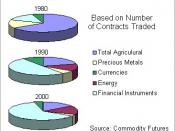Derivative securities are a result of financial innovation and their value is dependent upon the value of an underlying security. They are also called contingent claims since their value is contingent upon the value of another security. The most important use of derivatives is risk-reduction, called hedging. Derivatives "hedging," is based on the idea that the change in the value of a derivatives position can offset the change in the value of the underlying asset .
The derivatives market has developed in response to the uncertainty of prices, and therefore has provided a means of controlling this price volatility. The tendency of the market to move up or down in what appears to be a random manner has brought about the need for financial products which will protect the investor and hedge against the ill effects of market volatility. Derivatives called Futures and Options might do just that if used properly.
Major Types of Derivatives
Derivatives include interest rate futures contracts, forwards contracts, options on futures contracts, swap options, mortgages-backed securities, interest rate caps and floors, commodity-linked bonds, stock options and any other bets related to the values of other securities.
The purpose of this paper is to discuss forwards and futures contracts, their implications, applications globally and their advantages and disadvantages. Therefore, only a brief introduction to the other types of derivatives mentioned above will be provided.
Swaps are an agreement between two parties to exchange cash flows of one security for the cash flows of another. An interest rate swap on a bond for example, exchanges the cash flows of one bond for the cash flows of another bond, i.e., a fixed cash flow for a floating cash flow.
Mortgages are usually pooled and sold with a guarantee against default, provided usually by Fannie Mae and Freddie...


